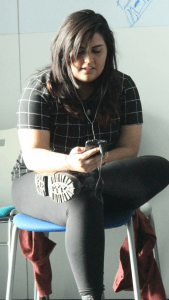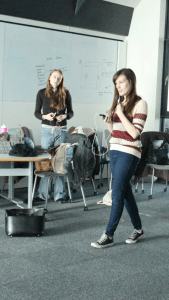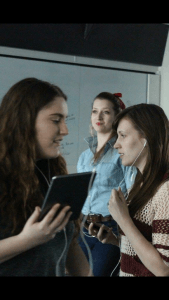This week, verbatim theatre was experimented with in rehearsal. ‘The term verbatim refers to the origins of the text spoken in the play. The words of real people…’ (Hammond and Steward 2008, p9). The particular form of verbatim we used was Headphone Verbatim, first pioneered by director Mark Wing-Davey in his Drama without Paper workshop in 2001 (Oades, 2014).
In a previous rehearsal we had been recorded answering interview style questions about what it meant to be an adult to us and how we had felt at various milestones in our life, for example going off to university. During this week’s rehearsal we each chose a recording that was not our own, and spent 10 minutes listening repeatedly to it through headphones. Then we attempted to speak the words of our subject at the same time as the recording. We did not attempt to copy the exact voice or accent of the person but tried to repeat the words in the same tone, dialect and context as they were first said. Some members of the group performed this in front of the group and it was interesting to hear imperfect but ‘real’ speech. Often there were a lot of pauses, ‘um’s’ and ‘err’s’ as well as regional ‘slang’, which is a contrast to what we as audiences usually hear in a theatrical piece and what we as actors usually perform.
(All photos by Oliver Samuals)
Of course with the use of ‘real’ people’s words there will always be ethical considerations to take in to account. As Janet Gibson details ‘Verbatim theatre uses the narratives of people who may perceive that their life stories and their identities are coextensive.’ (n.d, p10) Therefore we will have to be very particular about how we use the words of others in our piece and ensure we do not take them out of or distort the original context in which they were said, as this will not only be a misrepresentation of the words but also of the person who said them.
Hello, Goodbye & Happy Birthday by Roslyn Oades is a headphone verbatim piece which looks at a similar topic as our own performance “the threshold from child into adulthood, as well as, from self-sufficient adult into aged care dependency” (Oades, 2014). Although Hello, Goodbye & Happy Birthday focuses more on the “bookends of adult life” (Oades 2014). Aside from the use of headphone verbatim, Oades also used theatrical contrast to create Hello, Goodbye & Happy Birthday, for example some of the younger actors performed the audio created from the words of an elderly care home resident. Oades decided to use this technique of ‘ mismatching voices and bodies to explore perceptions of ageing and visibility’ (2014). Similarly in Monkey Bars by Unicorn Theatre this juxtaposition of voice and body is used as ‘adults playing adults’ speak the words of children (Unicorn Theatre, 2013). By creating this contrast between voice and body, examinations into identity and perspectives can be achieved. This is particularly relevant with our topic of adulthood as we can begin to examine if our perspectives of what it is to be an adult ‘grown up’ alongside us.
(Hello, Goodbye & Happy Birthday trailer, from Youtube 2014)
WORKS CITED
Gibson, J. (n.d) Saying it Right: Creating Ethical Verbatim Theatre. Macquarie University Faculty of Arts. Available from http://arts.mq.edu.au/documents/hdr_journal_neo/neoJanet2011_2.pdf [Accessed 26/02/15]
Hammond, W. and Steward, D. (2008) Verbatim Verbatim. London: Oberon.
Oades, R. (2014) Hello, Goodbye & Happy Birthday. [online] Available from http://www.roslynoades.com/HelloGoodbye.html [Accessed 26/02/15]
Oades, R (2014) Hello, Goodbye & Happy Birthday – behind the scenes [online video] Available from https://www.youtube.com/watch?v=gpE1OQX8wnY [Accessed 26/02/15]
Oades, R. (2014) Hello, Goodbye & Happy Birthday – trailer. [online video] Available from https://www.youtube.com/watch?v=gpE1OQX8wnY [Accessed 26/02/15]
Samuals, O. (2015) Photo of Headphone Verbatim in Rehearsal
Unicorn Theatre (2013) Monkey Bars [online] Available from https://www.unicorntheatre.com/whatson/38/monkey-bars [Accessed 26/02/15]


